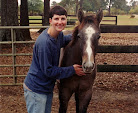Until this year, what that phrase meant to
me was that horsemanship was like one of those mythological quest journeys,
full of wonder and new worlds, yes, but also fraught with hardships, set-backs,
and some seriously ugly monsters.
You manage to sail through the narrow strait
with scary-ass perils on either side--hooray!--only to be blown back through it
again because some moron decided to open the bag that contained all the winds.
This was the nature of my horsemanship
journey for the past 14 years. It involved a lot of people telling me,
"It's about the journey--not the destination," and me trying really
hard not to be dispirited by the fact that there were a lot more monsters in my
future and that I would spend the rest of my life, apparently, sailing into the
wind. Happily, I guess, digging deep is my most fundamental, my most
unfaltering skill. And boy did I get to use it a lot.
But all of that changed when I met Mark Rashid. Suddenly I realized, Hey! Vacations are journeys too. Why not let
horsemanship be *that* kind of journey?
There's the same flash of new understanding
on vacations, the same exhiliration of adventuring in unknown lands, but the
difference is that we don't have to constantly remind ourselves that it's
"about the journey" -- of course it's about the journey! That's the
whole freaking point! To enjoy the trip!
With Mark, this is obvious, because studying
with Mark is exactly like being on vacation. I feel all the mental burdens that
I've placed on myself lighten. I move easily into the present moment and
delight in being there. I feel how simple things can be when I just let them
be. I pay attention to how I feel, and I do a lot more of what feels good.
Things become easier, simpler, truer, and more clear. I go to sleep thinking
about the amazingly cool vistas that opened up before me that day, and I wake
up keen to experience more.
And the monsters and the winds? Funny how
those things pretty much disappear when you're on vacation . . .




